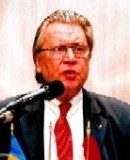Initiation Speech
October 31, 2007
Mr. Seiji Onoki,
Dr. Uwe Schmelter,
��Automation and Earth Environment��
Mr. Seiji Onoki,
President and Director, Yamatake, Ltd.
��I joined Tokyo Rotary Club last May by the recommendation of Mr. Kimura and Mr. Asano.
��I wish to talk about automation and how automation improves the environment of the earth. We have automation in many areas. Automation used at factory called FA. Automation used to process petroleum, iron etc. called PA. Air-conditioning in the buildings, called BA. Home automation, called HA. Laboratory automation called LA. There are many types of automation and they are same in their basic function and structure.
��Automation consists of Sensor like nerve system of human being. Control which is like brain in human being. And Actuator which is like human hands.
��For example, if we have no automation, we have to measure the temperature by thermometer, or judge by your sense and feeling, hot or cold. Then you will adjust the valve of hot water to get comfortable temperature. If you have automation, you can connect thermometer to temperature control equipment. Then the electric valve will be operated to control the temperature.
��Principle of automation is simple but actual system is more complicated. Even if the temperature adjustment started, it takes time to adjust the temperature of the room, because of the size of the room. Time lag is the problem always.
��At a kitchen of Chinese food of a hotel, it got very hot when they were cooking food for lunch but it was a short period of time.. The room temperature of the kitchen varied very much. By connecting the gas burner of the kitchen and air conditioner, they succeeded to control the kitchen temperature at comfortable level always and it could save energy too.
��In the fall of 1989, The General Assembly of United Nations decided to hold ��United Nations Conference on Environment and Development�� (Earth Summit) and the Conference was held in June 1992 in Rio de Janeiro, Brazil. It was just 20 years, after the United Nations Human Environment Conference was held at Stockholm. The number of participating countries increased and the participants were mostly Presidents or Prime Ministers. This shows Environmental Problem of Earth is imminent and the necessity of discussing ��Change to the Sustainable Growth�� including developing countries.
��Automation technology which has developed to the present level is expected to develop further to meet the needs of the coming new generation.
 ��Actual Cultural Relations and
��Actual Cultural Relations and
Cultural Politics
between Japan and Germany��
Dr. Uwe Schmelter,
Director General of Goethe-Institut Japan and Regional Director for East Asia
��The Goethe-Institut is the official mediator-institution of the Federal Republic of Germany in the field of Foreign Cultural Policy operational world wide with 130 institutes in 81 countries and 13 institutes in Germany. We promote the study of German language abroad and in Germany and encourage cultural cooperation and exchange.
��We also foster the knowledge about Germany by providing information on it��s culture, society and politics through our libraries, information centers and reading rooms.
��The oldest and largest one is the institute in Tokyo, founded in 1962, followed by Kyoto in 1963 and Osaka in 1964.
��The basis of German Foreign Politics is defined mainly by three pillars: Politics, Economy and Culture. We think that Cultural Policy opens ways to communication and to peaceful dialogue among cultures, political systems, different ideologies and religions and social values. Through this it might even provide contributions to processes of rapprochment, detention and better mutual understanding.
��The historically grown, solid Japanese-German political, economical and cultural relations offer best and most fertile grounds, as we can hardly find them somewhere else in the world. More than 150 years ago, Germany became one of the earliest steady and friendly partners of Japan. On the occasion of the recent state visits of former Prime Minister Abe to Germany and of Chancellor Merkel to Japan the main overall mutual statement was :��Our�� relations couldn��t be better as they actually are.��
��As highly industrialized nations, Japan and Germany share many similar or even problems of modern society thus providing a wide range of mutual dialogue reaching far beyond the very close cultural relations.
��Within the language sector, English of course is the number one foreign language in education in Japan as elsewhere in the world. The German language, for a long time the foreign language number two in Japan after English, meanwhile finds a decreasing interest among young people due to clear orientation towards Chinese and Korean language which meanwhile gained rank two and three after English and ahead of German.
��Therefore one of our activities is a nationwide marketing to waken and to increase the interest for learning the German language, especially among young people.
��To attract the interest for Germany among young people in Japan, we are intensifying our efforts by increasing the number of cultural events which range in the segment of ��Youth Culture��.
��Cultural cooperation and exchange between Germany and Japan is one of the most challenging and rewarding professions at a time. The close Japanese-German friendship, beyond all cultural differences between our two nations, offers such solid grounds for this work that we feel permanently and willingly obliged to contribute our share to the fostering and sustaining development of our many relations.